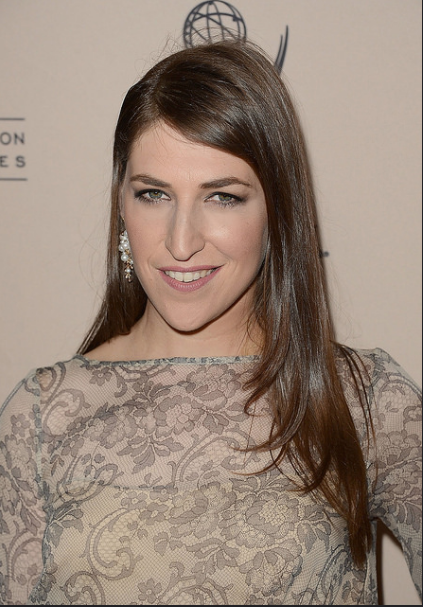
Stop Victim Blaming: A Response to Mayim Bialik from One Member of the Orthodox Community to Another

Photo credit: Jason Merritt
On October 13th, the actress Mayim Bialik wrote an op-ed titled, “Being a Feminist in Harvey Weinstein’s World” about the ways in which she feels that her non-traditional Hollywood appearance, and her “modest” behavior has kept her safe from advances by men like Harvey Weinstein. She wrote, “I still make choices every day as a 41-year-old actress that I think of as self-protecting and wise. I have decided that my sexual self is best reserved for private situations with those I am most intimate with. I dress modestly. I don’t act flirtatiously with men as a policy.” It’s baffling that someone like Bialik would take a stance like this as a feminist, to put the burden of preventing an assault on the person being assaulted, and not the assaulter. Let’s be clear: this op-ed is the definition of victim blaming. In Bialik’s world, it’s not Harvey Weinstein’s fault for pressing forward as the women said no, but the women themselves for being too conventionally beautiful, wearing too much make-up, or pair of tight jeans. Weinstein’s victims were “asking for it.”
I am also surprised to hear this take from Bialik for another reason—because she is an Orthodox Jew. As such, Bialik should know that sexual assault happens in our community, where many individuals take great care to act and dress according to her definitions of “modesty.” I once had a camp counselor who hesitated to buy a pair of burgundy shoes because they could be misconstrued as immodest. According to Bialik’s philosophy, this careful attention to modesty should equate to a zero percent rate of sexual harassment and violence in the Orthodox community. Sadly, we all know that this isn’t the case.
4 comments on “Stop Victim Blaming: A Response to Mayim Bialik from One Member of the Orthodox Community to Another”
Comments are closed.




While I think this is a very important discussion, about harassment and abuse within the orthodox community and, of course, the problem of ‘victim shaming’, I don’t think that you needed to point to Mayim Bialik’s essay in order to have that discussion, especially since Bialik does not, in my reading, do anything to deny, ignore, or exacerbate those problems! In fact, she in no way even refers to them. And, for that, she should not be blamed (nor should the fact that she happens to be an orthodox Jew be allowed to obscure the actual words she wrote)! Mayim BIalik wrote a thoughtful piece about the industry she knows best and her personal experiences. To attack her for noting the way she presents herself seems almost anti-feminist to me. Her comments do not amount to a “philosophy” and even if they did, how in the world do you get to the conclusion that “According to Bialik’s philosophy, this careful attention to modesty should equate to a zero percent rate of sexual harassment” — you cannot ascribe such a thought to Bialik based on the words she has written. Again, it’s an important topic to raise but I find all the outrage over Bialik’s piece to be disingenuous, and simply an attention-grabbing opportunity (more clicks!) for the article that you (rightfully!) want to write– but it truly bothers me that you do so at the expense of a person who has always demonstrated a very clear-headed feminist stance and whose words you need to twist in order to get to your point.
Let’s get real about who was exploiting an attention grabbing opportunity: If Bialik was not, in fact, implying that sexual assault victims are at least partially to blame due to their appearance and presentation, then why was her piece relevant and published in the New York Times? Who then, cares that Bialik “make choices every day as a 41-year-old actress that [she] thinks of as self-protecting and wise” such as dressing modestly? She is plainly stating that by dressing modestly she protects herself from sexual harassment and assault, and clearly implying that HW victims must have fallen short of that standard of modesty. If that is NOT what she is saying, then why the heck are we reading about the dressing choices of a B list actress in the New York Times??? Bialik used the outcry over HW’s abuse to bring attention to herself, and very clumsily inserted herself into a conversation on a matter she clearly does not understand, causing significant pain to sexual assault survivors who picked up on her not so subtle victim shaming.
Yeah, sorry, no, it’s the logical extension of her argument that modesty is “protective.” She doesn’t have to specifically refer to the Orthodox community for logic to work that way.
It is true that sexual abuse exists in the Orthodox community as it does in virtually every community. The abuse is not the fault of the victims but this article misses the point.
Mayim Bialik is making a very valid and true point. The Orthodox community has much lower instances of martial infidelity and marriages in the Orthodox community are healthier and less prone top divorce and separation. This is because standards of modesty are adhered to. VP Mike Pence was mocked for saying that he does not eat out alone with any lady other than his wife but polls showed that a majority of Americans found his position to be prudent. Mayim Bialik should be applauded for her common sense approach even if it is politically incorrect.